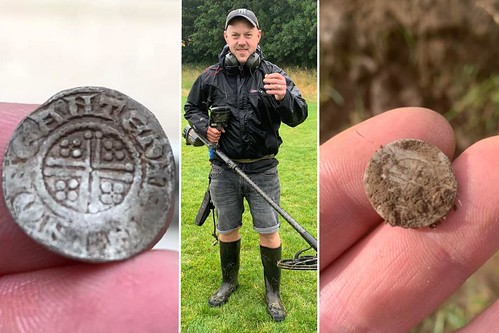
PREV ARTICLE
NEXT ARTICLE
FULL ISSUE
PREV FULL ISSUE
HENRY III SHORTCROSS PENNY FOUNDLarge hoards get all the headlines, but metal detecting finds come in onesies and twosies, too. -Editor Matthew Hepworth unearthed a Henry III Shortcross penny, estimated to have been minted between 1222-1236 in Canterbury by a Moneyer named Simon, in the Carnforth area. "It's only my second every discovery of this type, and strangely, it doesn't come under treasure as it was a single coin," he said. "It was near the gateway so I've walked over it many times. It's so strange how you can miss these targets. "First and foremost, you need the landowners' permission to detect on their land. I always keep him informed so I've built up a collection for him so it's joint ownership between myself and the landowner." "I've been detecting for 30 years now. I'm member of the Lune Valley Detecting Club and we've had a good year last year for finds," he said. "I usually go out detecting with David and we found another section of the Viking silver that was first discovered in 1997, which is in the Lancaster Museum. "We've found the rest of it, and it's currently being processed through the usual official channels - it'll become public soon. "Another one of our best finds was a horde of 28 Roman silver coins but that wasn't in our area, that was in the Midlands.
To read the complete article, see:
Wayne Homren, Editor The Numismatic Bibliomania Society is a non-profit organization promoting numismatic literature. See our web site at coinbooks.org. To submit items for publication in The E-Sylum, write to the Editor at this address: whomren@gmail.com To subscribe go to: https://my.binhost.com/lists/listinfo/esylum All Rights Reserved. NBS Home Page Contact the NBS webmaster 
|

